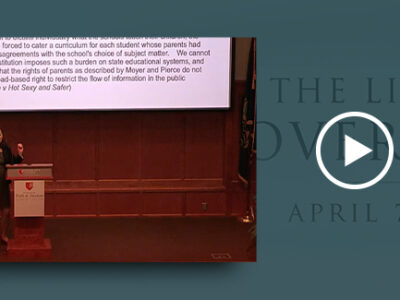Editor’s Note: The “V&V Q&A” is an e-publication from The Center for Vision & Values at Grove City College. Each issue will present an interview with an intriguing thinker or opinion-maker that we hope will prove illuminating to readers everywhere. In this latest edition, the executive director of The Center for Vision & Values, Dr. Paul Kengor, interviews Dr. Steven Jones, assistant professor of sociology at Grove City College. This is the fourth in a series of Q&As with participants in the forthcoming April 12-13 conference, “The De-Christianization of Europe: From Nicaea to Nietzsche,” to be held on the campus of Grove City College.
V&V: Dr. Jones, you are a sociologist who, among other areas, specializes in the issue of secularization. Define what is generally meant by “secularization.”There are almost as many definitions of secularization as there are people who write about it. Generally speaking, secularization is the idea that more and more dimensions of our lives are less and less dominated by religion. Secularization, though, is more than a description of the way things are. It is a theory that claims that as the world modernized, it had to secularize; that is, the modern nations are and must be secular nations. And it is on this point that there is much debate.
Steven Jones:
V&V: You note that most modern sociologists, as well as theologians, philosophers, historians, and even psychologists, have proclaimed that secularization has indeed swept the world. Yet, you maintain that the reality of the 21st century is that religion, as you put it, “has not gone quietly into the dark of night.” Explain what you mean.Multiple generations of political and social theorists, as well as philosophers and even some theologians, bought into, rather uncritically in many cases, the basic idea that modernization and secularization were inseparable. But then, starting in the late 60s, some observers began looking around the world and noticing that religion seemed to be alive and well, in spite of our best theories that virtually all predicted its demise. The world is as furiously, some would say insanely, religious as it ever was. To put it bluntly, we all had a bit of egg on our face; while we discussed and debated the implications of secularization, the world went out and, as my grandmother would put it, got religion.
Jones:
V&V: Your model for your assertion are the Pentecostal and Charismatic movements. What are those movements? Are they one and the same?: I would not use the word “model” regarding the Pentecostal and Charismatic movements. Suffice it to say that the Renewal movement (my umbrella term for all the waves of Pentecostal and Charismatic experience) is the most significant religious phenomena of the last 100 years, and that it stands in stark contrast to the old theory of secularization. All around the world the Renewal movement has re-energized declining churches … and it has done so by appealing to subjective experience and an eager pursuit of divine manifestations that in some ways defy rational explanation. The truth is that all over the world Renewal churches are growing, so much so that by 2050 it is likely that almost 40% of all Christians in the world will be in the Renewal movement. Not bad for a movement that started just over 100 years ago!
Jones
V&V: Has this Renewal movement grown as dramatically in Europe as in other parts of the world? If not, could this be the result of a general drag by a wider secularization in Europe? The most interesting thing about Europe’s reception of Pentecostalism is that while it is growing there, that growth is not as dramatic as it is in other places. And the Renewal movement does not seem to be reversing the larger trend of the de-Christianization of Europe. Though there was significant hope, even expectation, that Renewal would revive European Christianity, that does not seem to be the case, or at least not yet.
Jones:
V&V: Unlike, say, Lutherans in Germany, or Catholics in France, one would imagine that Pentecostals do not have the cultural bonds of other European Christian denominations, right? Does this make their ability to grow even more of an uphill battle? Yes, absolutely.Being Lutheran was one way of being German, for example … but being Pentecostal does not establish one as part of the national memory of any European nation. In fact, being Pentecostal is often associated with comparatively disadvantaged and marginalized groups such as Third World immigrants or refugees.There is a sense in which being Pentecostal, then, is to be foreign in Europe, even if the person in question is as European as he or she can be.
Jones:
V&V: Are there any lessons here for America? There are numerous possible implications for American religion, but one of the most provocative and in my view most important lessons is that religious renewal should not be seen as a vehicle for national unity or national renewal. One of the things that Renewal has done well is to look across national borders to find unity in the body of Christ—an infinitely more important goal, in my view.
Jones:
V&V: Dr. Jones, thank you for speaking to the Center for Vision & Values. We look forward to your lecture on April 13. Thank you.
Jones:



